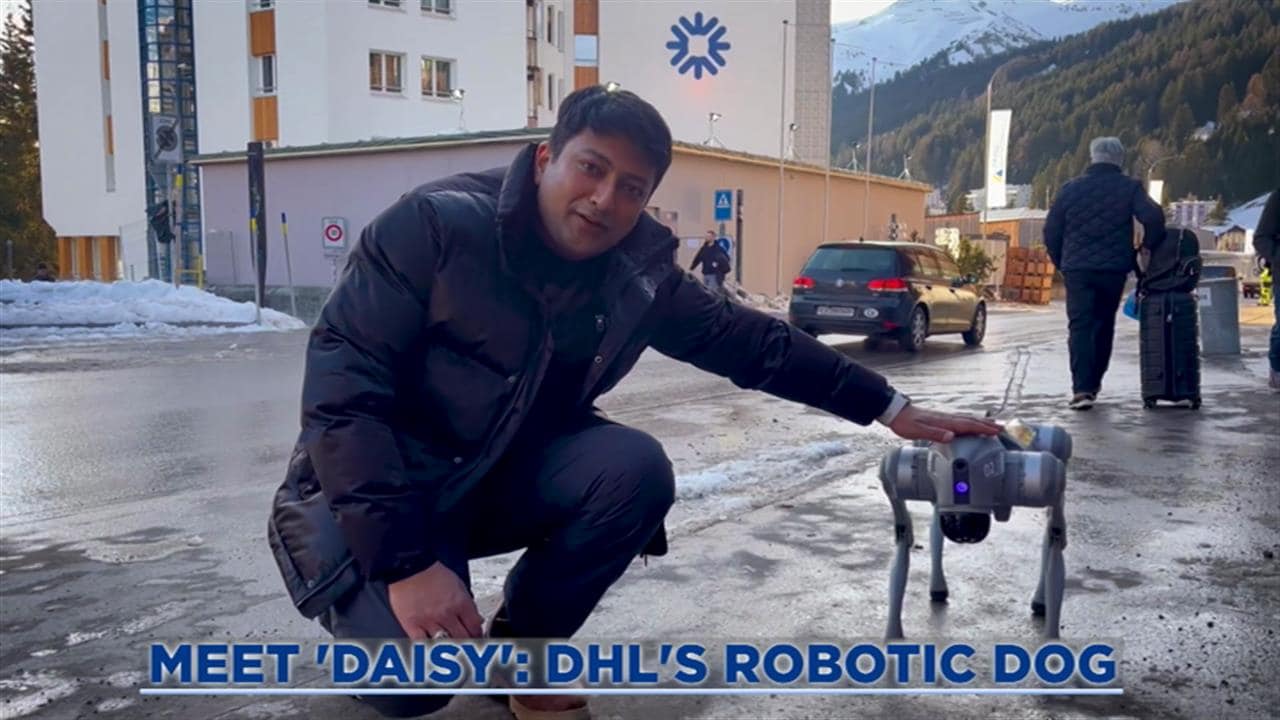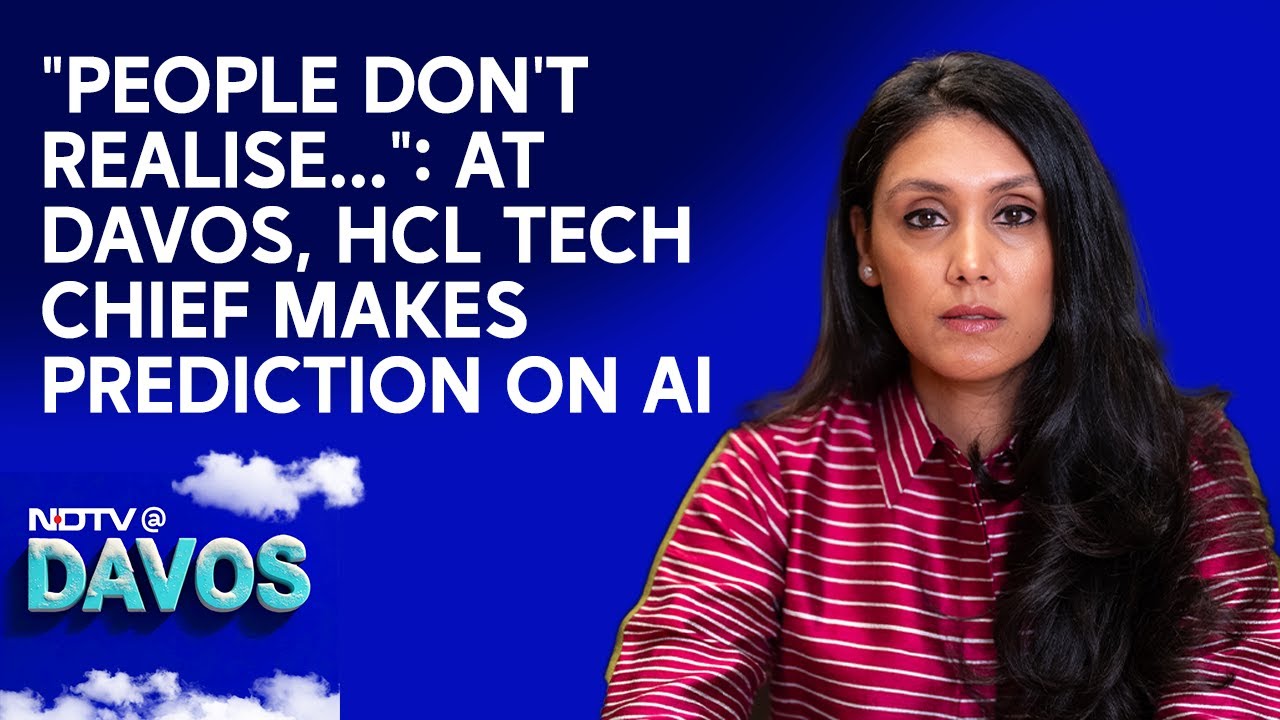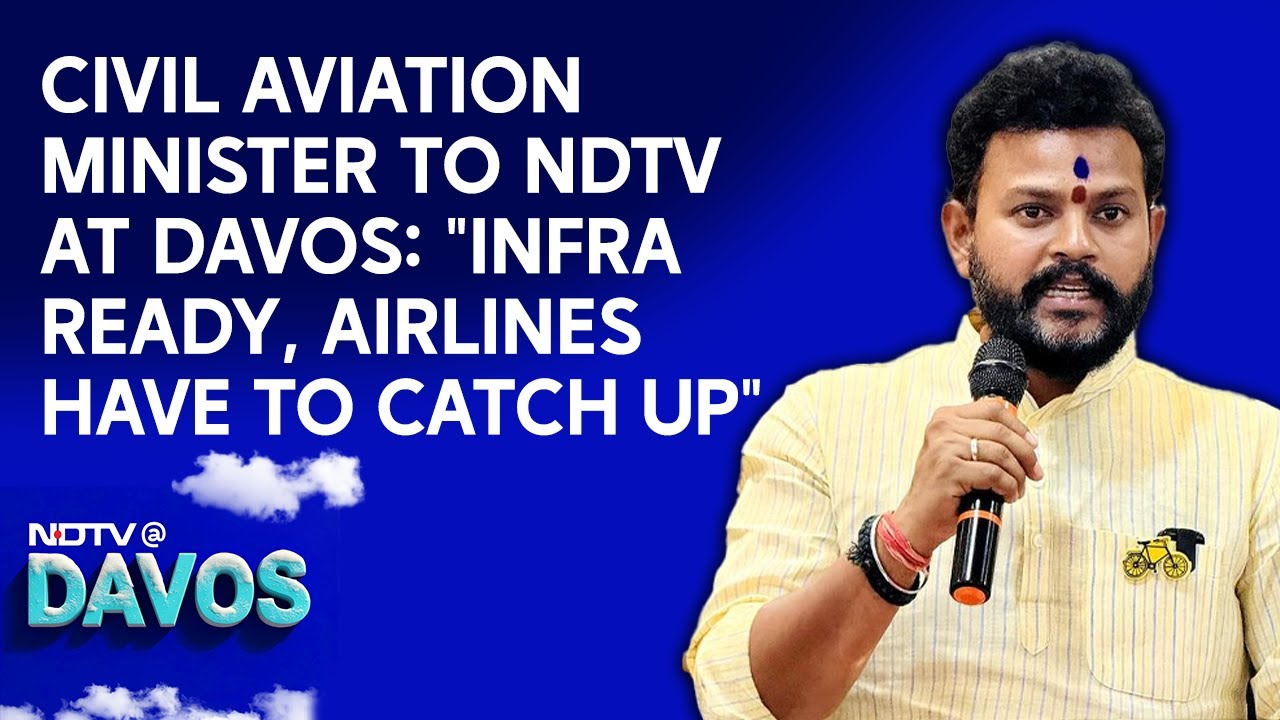

- Home/
- Latest Videos/
- PM Modi Addresses World Leaders, CEOs At Davos
PM Modi Addresses World Leaders, CEOs At Davos
Prime Minister Narendra Modi acknowledged with a namaste the loud applause as he was introduced as the keynote speaker at this year's World Economic Forum's plenary session at the Swiss mountain resort of Davos. Speaking in Hindi, PM Modi is showcasing the India growth story to world leaders and global CEOs, also calling for countries to unite to tackle what he called the three big challenges that the world faces - "climate change, terrorism and an increased self-centredness."
Here are the highlights from Prime Minister Modi's speech:
Namaskar, I am delighted to be here in Davos for the 48th meeting of the World Economic Forum.
I thank the government and citizens of Switzerland for the warm welcome. The last time an Indian PM came to Davos was in 1997 when Deve Gowda came here.
In 1997, India's GDP was little over $400 billion. Now it has grown more than six times. In 1997, the Euro wasn't in circulation, Brexit hadn't happened, the world hadn't heard of Osama bin laden or Harry Potter. It was a time when chess players weren't at risk of losing to computers, Google wasn't there and if you searched for Amazon, you would find information about jungles and rivers. It was a time when only birds tweeted. Today, two decades later, the world and society are complex networks.
Even at that time Davos was ahead of its time, as it is today.
The subject of Davos meet this time is 'Creating A Shared Future In A Fractured World'.
There are fast moving economical and political changes in the world. Peace, stability, security face new and serious challenges.
A technology-driven world has affected all aspects of our society. Social media is a big example of how technology is being used to join, bend and break our world. There is a race after data because it is said, that the one who controls data will dominate the world.
On one hand science, technology and economic progress can lead mankind to progress, but on the other hand, it can cause painful wounds. Many of the changes are creating walls that are making the path to peace a difficult one.
In this environment, there are many important questions that demand an answer for the future of humanity. Is our progress deepening our rifts? We have to overcome obstacles and distances for a bright future. In India, we have always believed in unifying people, not dividing them. Indian philosophers have said for thousands of years that the world is one family.
We are tied together as one family, a shared thread binds us. This philosophy is relevant to tackle the divides and distances of our times. But it is true that we face a lack of consensus in ways to overcome them. There are differences even within families, but when there are challenges, we must all come together to face them.
Friends, the challenges that I am alluding to are many and widespread, but given the limited time that we have, I'll mention three of the biggest ones.
The first one: Climate change
Glaciers are receding, the Arctic ice is melting, islands are going under water or are about to. Heat and cold, excessive rain and drought - effects of extreme weather are seen everywhere. Even here, we are seeing the highest snowfall in 20 years.
We should have shed our divisions and united to tackle the challenge, but we must ask honestly if we have done so. Everyone says climate emissions must be reduced, But how many developed countries reach out to developing nations with the technology required to do so?
Thousands of years ago, our sacred texts read that we humans are the children of Mother Earth. But then why do we see a war between humans and environment?
Father of the nation Mahatma Gandhi always endorsed utilisation based on need, and opposed greed. But we have wandered far from that thought and exploited nature. We must ask ourselves, is this development or is this deterioration?
The other big challenge is terrorism. You all are familiar with the impact of terrorism. All I want to draw your attention to, is that just as dangerous as terrorism is, even more so is the false distinction made between good terrorists and bad terrorists. Another very dangerous thing is the trend of educated young people from prosperous families joining terrorism.
The third challenge is increased self-centredness around the world. Globalisation around the world is shrinking. Everyone talks of an inter-connected world but the shine of globalisation is reducing. We must see if the global organisations created after World War II reflects the new dynamics of the world today. Some world powers don't just want shun globalisation but they want to stall it. An example of this are new tariff barriers.
Mahatma Gandhi had said I don't want the walls and windows of my world be closed from all sides. I want the air of the world to come in freely but it shouldn't uproot my home. India follows this philosophy. We Indians understand the value of diversity. We understand the importance of freedom and democracy.
In 2014, India's 600 crore voters, for the first time gave a complete majority to one party, and we have always strived for 'Sabka Saath, Sabka Vikas'. And this forms the bedrock of all policies of my government. Be it opening bank accounts for all Indians to ensure financial inclusion, or digital inclusion, or gender justice. Progress is only real when it helps everyone and everyone joins us in the journey.
Our path to progress is reform, perform and transform. This is why investing in India, travelling to India, manufacturing in India has become much easier than before. We have pledged to end license raj, we are removing red tape and laying out the red carpet. New doors for Foreign Direct Investment (FDI) are being opened. 1400 laws that were hurdles to progress have been scrapped. GST has been implemented, technology is being used to increase transparency. Democracy, demography and dynamism are shaping our destiny today.
In 3.5 years, India has seen massive changes that accept the aspirations of 1.25 billion Indians. Innovation and entrepreneurship is making young Indians job givers, not job seekers. For a shared prosperity, we have to work together, shedding our differences.
The world's economic and security organisations need reforms, and the world's economic progress must be faster. India has always cooperated with the world to tackle challenges. India has been the largest contributor in the UN peacekeeping force in terms of troops. India has always been the first responder to crises in neighbouring and friendly nations. A predictable, stable, transparent and progressive India will continue to be the good news in an uncertain world.
India will always be a unifying and harmonising force. Rabindranath Tagore had written of a heaven of freedom where the world is not divided by narrow walls. Let's make that a reality.
I invite you all to come to India - If you want wellness with wealth, come to India; If you want wholeness with health, come to India; If you want peace with prosperity, come to India. Remember, that you will always be welcome in India.
Related Videos
Latest Stories
Read More- Press Trust of India | Monday January 19, 2026 , Davos
As it flagged billionaires usurping the political landscape globally, rights group Oxfam on Monday cited India's reservation system as a "compelling" example of progress on how ordinary people can be politically empowered.
- Reported by Vishnu Som, Edited by Debanish Achom | Friday January 24, 2025 , Davos/New Delhi
The success of companies in using artificial intelligence (AI) depends on how they reskill their employees, Wipro Ltd Executive Chairman Rishad Premji told NDTV on the sidelines of the World Economic Forum (WEF) meeting in Davos.
- Reported by Vishnu Som, Edited by Debanish Achom | Thursday January 23, 2025 , Davos/New Delhi
Artificial intelligence (AI) is one of the focus points of the World Economic Forum (WEF) meeting in Davos. HCL Tech Chairperson Roshni Nadar Malhotra, recognising the role that AI plays and will play in the years to come.
- Reuters | Thursday January 23, 2025 , DAVOS Switzerland
US President Donald Trump said on Thursday he wanted to meet Russian President Vladimir Putin soon to secure an end to the almost three-year-old war with Ukraine,
- Agence France-Presse | Friday January 24, 2025 , Davos, Switzerland
US President Donald Trump issued a blunt warning to global elites in a video message to the World Economic Forum on Thursday: Make your product in the United States or pay tariffs.
- NDTV Newsdesk | Thursday January 23, 2025
Terming her meeting with Microsoft co-founder and billionaire philanthropist Bill Gates at Davos as "impactful", former Union Minister Smriti Irani said Thursday they "reaffirmed our shared dedication to empowering women".
- Press Trust of India | Thursday January 23, 2025 , Davos
Exuding confidence in the India growth story, industrialist Shobhana Kamineni said on Thursday there is no leader in the world other than Prime Minister Narendra Modi who can 'bend it like Beckham' when it comes to promoting economic growth.
- Press Trust of India | Thursday January 23, 2025 , Davos
Any further sanctions against Russia will not have any impact on India's crude oil requirements and the global prices should remain stable in the $75-80 per barrel range, as all sanction fears have already been factored in, Indian Oil Chairman said.
- Press Trust of India | Thursday January 23, 2025 , Davos
Artificial Intelligence may be doing a lot of work already but the world would still need 'head, heart and hands' of a human, Union Minister Jayant Chaudhary said on Thursday.
- Reported by Vishnu Som, Edited by Debanish Achom | Thursday January 23, 2025 , Davos/New Delhi
One of the most exciting sectors in India is civil aviation. Just a couple of years ago, Indian consumers had little choice, but now with several large airlines flying and proactive government policies, Indian aviation is one of the largest in the wo
- Reported by Vishnu Som, Edited by Debanish Achom | Thursday January 23, 2025 , Davos/New Delhi
Maharashtra, one of the largest states in India, has a huge presence at the World Economic Forum (WEF) in Davos. The team is led by Chief Minister Devendra Fadnavis, who told NDTV electric vehicles (EVs) are an area where the state has a major focus.
- Reported by Vishnu Som, Edited by Saikat Kumar Bose | Thursday January 23, 2025 , Davos
Amid the nationwide debate on work-life balance after problematic remarks by some industry leaders, Adar Poonawalla, CEO of vaccine manufacturer Serum Institute, has said it is not humanly possible to be productive beyond a certain number of hours


























